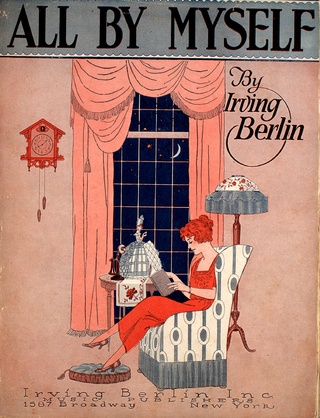"If I Give My Heart to You" is a popular song written by Jimmy Brewster, Jimmie Crane, and Al Jacobs. The most popular versions of the song were recorded by Doris Day and by Denise Lor; both charted in 1954.
"Temptation" is a popular song published in 1933, with music written by Nacio Herb Brown and lyrics by Arthur Freed.
"Ballerina" is a popular song, sometimes known as "Dance, Ballerina, Dance". The song was written by Carl Sigman with lyrics by Sidney Keith 'Bob' Russell. Published in 1947, the tune is listed as ASCAP Title Code 320012517.
"Red Sails in the Sunset" is a popular song. Published in 1935, its music was written by Hugh Williams with lyrics by prolific songwriter Jimmy Kennedy. The song was inspired by the "red sails" of Kitty of Coleraine, a yacht Kennedy often saw off the northern coast of Northern Ireland and by his adopted town Portstewart, a seaside resort in County Londonderry.
"Dear Hearts and Gentle People" is a popular song published in 1949 with music by Sammy Fain and lyrics by Bob Hilliard. The song refers to the singer's hometown, and different versions allude to a range of U.S. states.
"Linda" is a popular song written, taking its name from then-one-year-old Linda McCartney. It was written by Jack Lawrence and published in 1946.
"Have I Told You Lately That I Love You?" is a popular song written by Scotty Wiseman for the 1944 musical film, Sing, Neighbor, Sing and performed by Lulu Belle and Scotty. It was their greatest hit and one of the first country music songs to attract major attention in the pop music field. Although the song was featured in the movie, it was not released by Lulu Belle and Scotty until 1947. The first released version of this song was by Gene Autry in 1945.
"The One I Love (Belongs to Somebody Else)" is a popular song composed by Isham Jones with lyrics by Gus Kahn. The song was recorded by Isham Jones' Orchestra on December 21, 1923, at Brunswick Studios in New York City, and published on January 7, 1924. On January 17 in Chicago, Jones recorded another version, with Al Jolson on lead vocals. Both versions made the charts that Spring, with Jolson's peaking at number 2, and Jones' at number 5. Sophie Tucker recorded her version February 1924, released on Okeh 40054.
"I'll Get By (As Long as I Have You)" is a popular song with music by Fred E. Ahlert and lyrics by Roy Turk. The song was published in 1928. Versions by Nick Lucas, Aileen Stanley and, most successfully, Ruth Etting, all charted in America in 1929.
"Hello, Young Lovers" is a show tune from the 1951 Rodgers and Hammerstein musical, The King and I. It is sung by Anna, played by Gertrude Lawrence in the original Broadway production; by Valerie Hobson in the original London West End production; and by Deborah Kerr in the film version.
"Moonlight Becomes You" is a popular song composed by Jimmy Van Heusen with lyrics by Johnny Burke. The song was written for the Paramount Pictures release Road to Morocco (1942) and published in 1942 in connection with the film. Vic Schoen wrote the arrangement.

"I Wonder Who's Kissing Her Now" is a popular song. The music was written by Harold Orlob, the lyrics by Will M. Hough and Frank R. Adams. Orlob worked for Joseph E. Howard generating songs for Howard's productions and Howard presented the song as his own work for several years. The song was published in 1909 and was first introduced in the 1909 musical The Prince of To-Night when it was performed by Henry Woodruff.
"Oh, How I Miss You Tonight" is a popular song, published in 1925, written by Benny Davis, Joe Burke, and Mark Fisher. Popular recordings of the song in 1925 were by Ben Selvin, Benson Orchestra of Chicago, Lewis James and Irving Kaufman.
"June in January" is a popular song with music by Ralph Rainger and lyrics by Leo Robin, published in 1934.
"Snuggled on Your Shoulder (Cuddled in Your Arms)" is a popular song with music by Carmen Lombardo and lyrics by Joe Young, published in 1932.

"All by Myself" is a popular song written by Irving Berlin, published in 1921.

"Out of Nowhere" is a popular song composed by Johnny Green with lyrics by Edward Heyman and published by Famous Music. It was popularized by Bing Crosby, and was the first recording under his Brunswick Records contract. He recorded it on March 30, 1931 and it became his first number one hit as a solo artist. Crosby also sang it in the film Confessions of a Co-Ed (1931) and in his short film I Surrender Dear (1931). He recorded it again in 1954 for his album Bing: A Musical Autobiography.
"Walking the Floor Over You" is a country music song written by Ernest Tubb, recorded on April 26, 1941 in Fort Worth, Texas, and released in the United States that year.
"Miss You" is a 1929 song by the Tobias brothers: Charles Tobias, Harry Tobias and Henry Tobias. It was the three brothers' first published song, and their first hit, but one of the few songs where all three collaborated.

St. Patrick's Day is a compilation album of phonograph records by Bing Crosby released in 1947 featuring songs with an Irish theme. This includes one of Crosby's most-beloved songs, "Too-Ra-Loo-Ra-Loo-Ral" which was number four on the Billboard Hot 100 for 12 weeks, and topped the Australian charts for an entire month, on shellac disc record. This version, the 1945 re-recording, was released earlier in another Crosby album, Selections from Going My Way.



